Hair loss is an increasingly common concern, affecting people of all ages and genders. Understanding the causes behind this problem is essential for adopting effective preventive measures and maintaining hair health. In this article, we explore the main causes of hair loss, from hormonal and genetic factors to the influence of stress and nutrition.
Additionally, we cover natural prevention methods, advanced hair treatments, and style changes that can help disguise volume loss, offering a complete and accessible guide for those looking to better care for their hair.
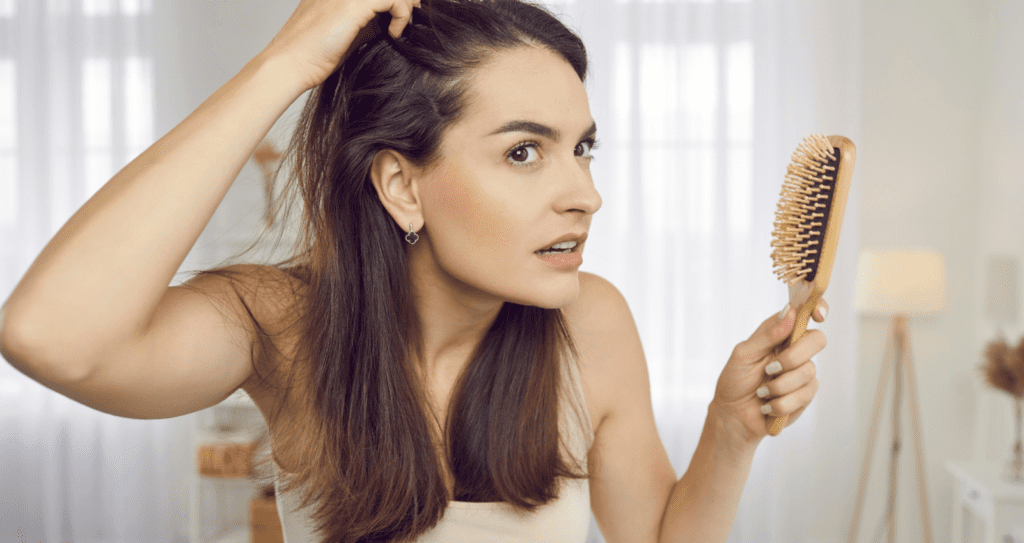
📜Contents
Common Causes of Hair Loss 🤔
Hormonal and Genetic Factors
Hair loss is often influenced by hormonal and genetic factors, with one of the most common causes being androgenetic alopecia. This condition, popularly known as baldness, affects both men and women and is related to the action of androgens, hormones that play a crucial role in the hair growth cycle. In genetically predisposed individuals, these hormones shorten the hair growth phase, resulting in thinner strands and eventually hair loss.
Additionally, conditions like polycystic ovary syndrome (PCOS), which causes a hormonal imbalance, also significantly contribute to hair loss, especially among women. Understanding these hormonal and genetic influences is vital for seeking appropriate treatments and possibly delaying the progression of hair loss.

Stress and Hair Loss
Stress is one of the most recognized triggers for hair loss, often leading to conditions such as telogen effluvium. This condition occurs when a large number of hair follicles prematurely enter the resting phase (telogen), resulting in noticeable hair loss weeks or months after a stressful event. The causes can range from severe emotional stress, such as the loss of a loved one, to physical factors, such as surgeries or illnesses.
Although telogen effluvium is usually temporary, understanding its link to stress can help in adopting stress management techniques, promoting recovery, and long-term hair health.
Nutrition and Deficiencies
Nutrition plays a crucial role in hair health, and deficiencies in essential nutrients can weaken and break hair.. Iron deficiency, for example, is one of the most common causes, especially in women. Iron is needed for the production of hemoglobin, which carries oxygen to hair follicles, and its deficiency can compromise the hair growth cycle.
Additionally, B-complex vitamins like biotin and proteins are essential for maintaining the strength and structure of hair. Unbalanced or restrictive diets can lead to these deficiencies, resulting in hair loss. Incorporating iron-rich foods, vitamins, and proteins into the diet, or considering supplements, can be essential for preventing and promoting healthy hair growth.

Prevention Methods and Natural Treatments 🛡️
Essential Oils for Hair Loss
Essential oils, such as rosemary and lavender, have been widely used to prevent hair loss and stimulate hair growth. Rosemary oil, in particular, is known for improving blood circulation in the scalp, which can strengthen hair follicles. On the other hand, supplements like biotin and collagen are becoming popular for their hair-strengthening properties.
Biotin, a B-complex vitamin, is crucial for the production of keratin, the main protein that makes up hair, while collagen helps maintain the elasticity and strength of hair strands. Using these products, combined with a healthy hair care routine, can be effective in preventing hair loss and promoting stronger, thicker hair.
Natural Hair Health Supplement 🍃
Natural supplements play a crucial role in maintaining hair health, providing essential nutrients often missing from the daily diet. These supplements help strengthen hair, reduce hair loss, and promote healthy growth.
An innovative example is FoliPrime, a natural and effective formula. Designed for men and women dealing with hair loss and thinning, FoliPrime works by detoxifying hair follicles, eliminating heavy metals, chemicals, and other toxins that compromise scalp health. With regular use, it strengthens strands and revitalizes hair, delivering a stronger and healthier result.
Healthy Lifestyles
Maintaining a healthy lifestyle is crucial for preventing hair loss. Reducing the use of heat tools, such as blow dryers and flat irons, can prevent thermal damage to the hair, which can weaken the strands and lead to breakage. Additionally, a balanced diet rich in fruits, vegetables, lean proteins, and healthy fats provides the necessary nutrients for hair growth.
Proper hydration is also essential, as dehydration can leave hair dry and brittle. Regular exercise, adequate sleep, and stress management techniques contribute to overall hair health.

Advanced Hair Treatments for Hair Loss 👨⚕️
Minoxidil and Finasteride
- The Minoxidil and finasteride are the most well-known and widely used pharmacological treatments, especially in cases of androgenetic alopecia. Minoxidil, a topical treatment, works by prolonging the hair growth phase (anagen), increasing the thickness of the strands, and slowing down hair loss.
- Finasteride, taken orally, inhibits the conversion of testosterone into dihydrotestosterone (DHT), a hormone that shrinks hair follicles. These treatments have shown significant effectiveness but are also accompanied by potential side effects, making medical consultation essential before starting any therapeutic regimen. Understanding how these treatments work, their benefits, and the associated risks is crucial for a successful approach to preventing hair loss.
Microneedling and Laser Therapies
- The Microneedling and laser therapies are innovative treatments that have been gaining popularity as alternatives or complements to traditional pharmacological treatments. Microneedling involves the use of small devices with fine needles that superficially puncture the scalp, stimulating collagen production and blood flow, which can enhance the absorption of topical products and promote hair growth.
- On the other hand, laser therapies, such as low-level laser therapy (LLLT), use red light to stimulate hair follicles, prolonging the hair growth phase. Both treatments show promising results in reducing hair loss and stimulating growth, offering additional options for those seeking to combat baldness effectively.

Style Changes and Care Practices 🎯
Adapting Haircuts and Hairstyles
With growing concern, many people are seeking haircuts and hairstyles that help disguise volume loss. Cuts like the “wolf cut,” which combines shaggy layers and textured bangs, help create the illusion of fuller hair.
Additionally, techniques like using volumizing products at the roots and avoiding hairstyles that pull the hair too tightly (such as tight ponytails) can help minimize the appearance of hair loss. These style changes are practical and offer aesthetic solutions for those looking to maintain a voluminous appearance despite reduced hair density.
Vegan and Natural Hair Loss Products
With increasing concern about the effects of chemicals on the scalp and hair, the demand for vegan and organic hair products has grown considerably. These products, free from sulfates, parabens, and silicones, are formulated with natural ingredients that promise to nourish the hair without causing damage, as seen with the previously mentioned FoliPrime.
Additionally, the choice of sustainable and ethical cosmetics reflects a global trend toward more conscious beauty care, which resonates with a growing audience concerned with hair health and environmental impact. Incorporating vegan and natural products into your hair care routine can not only prevent hair loss but also contribute to a healthier, more balanced scalp.

Conclusion 💥
Preventing hair loss involves a multifaceted approach, including identifying and treating underlying causes, such as hormonal factors and nutritional deficiencies, as well as adopting healthy habits and advanced treatments.
Understanding the available options and customizing hair care according to individual needs is essential for maintaining hair health and promoting hair growth. Taking proactive measures, combined with the use of appropriate products and modern techniques, can make all the difference in maintaining strong and voluminous hair over time.
Also Read – More Posts 💡

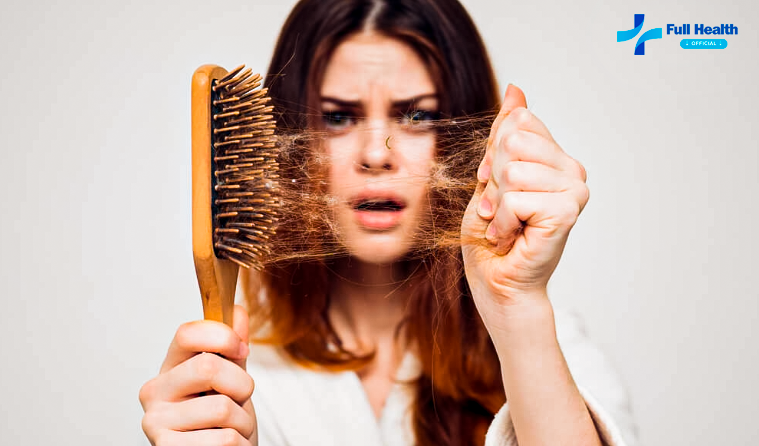
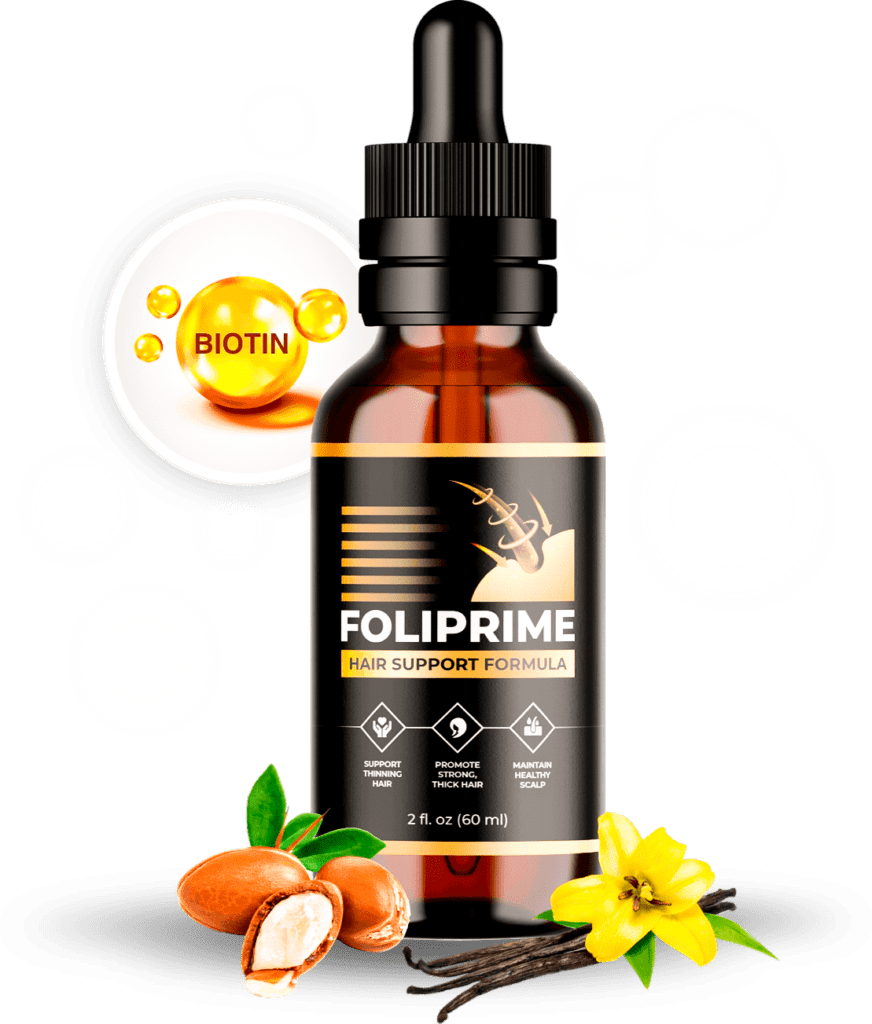

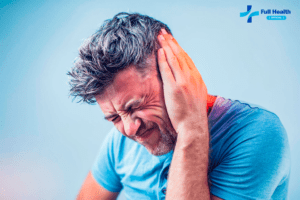
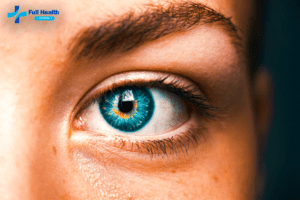
[…] Hair Loss: Causes, Care, Prevention and Treatments […]
[…] Hair Loss: Causes, Care, Prevention and Treatments […]
[…] Hair Loss: Causes, Care, Prevention and Treatments […]
[…] Hair Loss: Causes, Care, Prevention and Treatments […]
[…] Hair Loss: Causes, Care, Prevention and Treatments […]
[…] Hair Loss: Causes, Care, Prevention and Treatments […]
[…] Hair Loss: Causes, Care, Prevention and Treatments […]